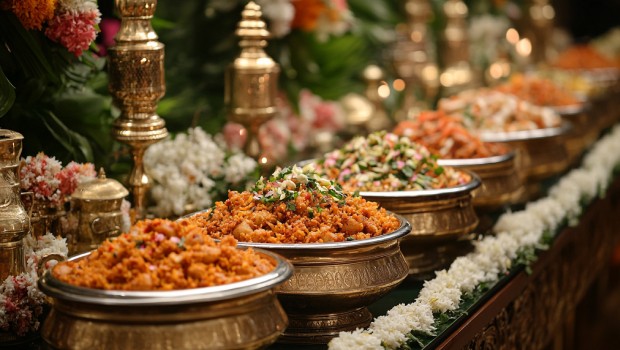
Indian weddings are legendary for their lavish spreads—thirty two item buffets, live chaat stations, midnight dosa counters, you name it. Yet behind the glamour lurks a sobering truth: up to 25% of food cooked for large functions in India never gets eaten, according to FSSAI estimates. In an era when climate change and rising food prices dominate headlines, wasting perfectly good paneer tikka is not just expensive—it feels downright unethical.
If you’re searching for wedding catering in Delhi that blends royal opulence with modern responsibility, ask one simple question: What happens to the leftovers?
Smart Planning: Preventing Extra Food Before It Happens
- Understanding the Guest List – We look at final RSVPs, age mix (kids vs. adults), and the eating style of the community (North Indian, South Indian, Jain, etc.). This helps us decide how many kilos of basmati or how many trays of gulab jamun to prepare.
- Choosing the Right Menu – Certain dishes, like dal makhani and biryani, stretch beautifully and reheat well, so they’re perfect for big fat Indian weddings. Lighter fare such as millet salads keeps the buffet colourful without piling on wastage.
- Relying on Experience – At Captain Joe, our chefs have catered everything from intimate roka ceremonies to 2,000 guest receptions. That real world know how means we plate up generous portions yet rarely over produce.
Culinary Jugaad: Giving Leftovers a Second Life
Even with the best planning, a few trays will come back untouched. Instead of dumping them, India’s best caterers rely on a bit of jugaad—creative reuse:
| Leftover Item | Next-Day Avatar | Crowd-Favourite Dish |
|---|---|---|
| Tandoori Chicken | Shredded & tossed with mint mayo | Wraps for a next-morning mehendi brunch |
| Veg Pulao | Shaped into patties, lightly pan-fried | Crispy rice tikki canapés |
| Rasgulla syrup | Reduced & flavoured with saffron | Drizzle over kulfi falooda |
All remakes follow strict FSSAI temperature controls (below 5°C for cold storage, above 60°C for hot holding) to keep food absolutely safe.
Feeding India—Literally
After in house repurposing, any wholesome surplus is promptly donated through trusted local food recovery groups. Dedicated teams collect the food soon after the celebrations, ensuring that a nourishing plate reaches someone in need the very same night. By following this give back routine every wedding season, we transform your celebration into a wider act of community care.
Why it matters for couples: Booking wedding caterers in Delhi NCR with strong donation pipelines lets your celebration nourish many more mouths than those on the guest list.
Root to Stem & Nose to Tail: Respecting Every Ingredient
Indian cuisine has long celebrated whole ingredient cooking—think ridge gourd peel chutney or mutton paya soup. Our chefs honour that heritage by:
- Turning cauliflower stems into creamy soups
- Sun drying tomato skins for tangy masala powders
- Pressure cooking chicken bones for rich shorba bases. The result? Dishes that taste like your nani’s kitchen yet look five star on the plate.
Menu Ideas That Naturally Curb Waste
Couples often ask for wedding catering menu ideas that are fresh, Instagram worthy, and eco friendly. Here are three strategies we recommend:
- Seasonal First – Serve winter greens like sarson ka saag in December weddings and light aam panna coolers in April receptions. Shorter farm to table journeys mean fewer spoilage losses.
- Modular Live Stations – Guests can customize their portion sizes for dishes like pav bhaji, momos, or other offerings, helping to reduce food waste and over-serving. This approach allows diners to choose the right amount for their appetite.
- Reusable Serveware – Terracotta kulhads and steel thalis not only look rustic chic but also cut down on disposable waste.
Why it matters when choosing a caterer
- Brand values: If a kitchen treats ingredients with respect, you can trust they’ll honour your guests the same way.
- Cost optimisation: Less waste translates into more budget flexibility for premium ingredients or live cooking theatrics.
- Social impact: Your celebration can feed more than just your invite list.
When comparing the top catering services provider in Gurgaon, ask about their waste management SOPs right alongside tasting menus.
Captain Joe’s Commitment: Gurgaon’s Zero Waste Pioneer
As leading caterers in Gurgaon, we weave zero waste principles into every step—from vendor selection (local farms in Sohna and Pataudi) to post event breakdown. Whether it’s a sangeet for 150 or a grand wedding in Delhi NCR , our promise stands: no flavour left behind, no ingredient forgotten.
Ready to craft a zero waste feast worthy of your milestone? Book caterers in Gurgaon online with Captain Joe—where elegance, flavour, and conscience come together in every impeccably planned course.
Conclusion: Big Fat Indian Weddings, Tiny Carbon Footprint
Indian celebrations will always be grand, but grandeur needn’t come with a mountain of waste. The new gold standard in wedding catering in Delhi marries culinary splendour with social and environmental stewardship. From precise planning to community feeding and compost fuelled stoves, the secret life of leftovers shows that luxury and responsibility can share the same thali.
So, the next time you plan a wedding, remember: a truly memorable feast is one that delights your guests and respects the planet. With Captain Joe, that vision is just a click away.

 Joe Differentiators
Joe Differentiators


